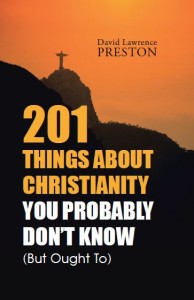We will soon be enjoying the Whit Bank Holiday – but how many people understand the nature of these celebrations?
Whit celebrates an even reported in Acts of the Apostles that is, frankly, so far fetched as to be unbelievable. Acts was written by the same man who wrote the Third Gospel, Luke. Its main purpose was to describe the events that unfolded after the crucifixion. It has almost nothing to say about the life and teachings of the Jewsish prophet, Yeshua bar Yehosef (Jesus).
It starts with the disciples gathering to decide what to do after the alleged sightings of their risen Master, tells how Christianity began to take shape and spread across the Eastern Mediterranean in the second half of the 1st Century and how it separated itself from Judaism. It ends with the Apostle Paul in captivity in Rome awaiting execution. He, not Yeshua, was the real founder of Christianity.
The first major event in Acts is the Ascension; this is what the Whit holiday is all about: Yeshua, now portrayed as the Christ figure, is lifted up and taken away on a cloud[1]. This immediately raises an interesting contradiction. At the end of ‘Luke’s’ Gospel[2] the Christ figure is carried up to heaven on the day of his resurrection: in Acts the Christ figure appears to the disciples (now renamed apostles) over a forty day period before a cloud whisks him away.[3] Remember, these accounts were written by the same author: either he had a poor memory, or there is some artistic licence here!
Pentecost – a festival in which Jews from many nations gathered in Jerusalem – follows soon after. According to Acts[4], the apostles were together one morning when they heard the sound of a violent wind, tongues of fire appeared, and they were filled with the ‘Holy Spirit’. These simple Galileans immediately started addressing the crowd in their own languages. The Apostle Cephas delivered a lengthy sermon[5], winning over many converts, and then discovered he had the power to heal.
If you believe these events really happened, then of course they did – for you!
Do you?
[1] Acts 1:9-10
[2] Luke 24:13-50
[3] Acts 1:3
[4] Acts 2:1-47
[5] Acts 2:14-26
©David Lawrence Preston, 24.4.2016
Follow me on Facebook and Twitter @David_L_Preston
Hay House/Balboa Press, 2015

Leave a Reply